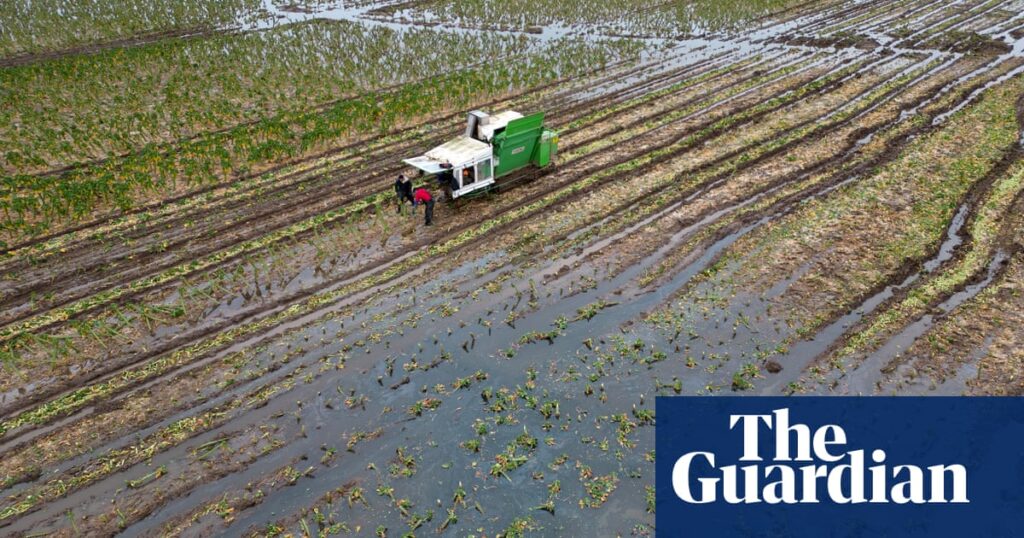‘Washout winter’ spells price rises for UK shoppers with key crops down by a fifth | Food

UK harvests of important crops could be down by nearly a fifth this year due to the unprecedented wet weather farmers have faced, increasing the likelihood that the prices of bread, beer and biscuits will rise.
Analysis by the Energy and Climate Intelligence Unit (ECIU) has estimated that the amount of wheat, barley, oats and oilseed rape could drop by 4m tonnes this year, a reduction of 17.5% compared with 2023.
The warnings come as farmers have borne the brunt of the heavy rainfall and bad weather experienced over the winter, with the UK experiencing 11 named storms since September.
In England, there was 1,695.9mm of rainfall between October 2022 and March 2024, the wettest 18-month period since records began in 1836.
This has resulted in planted crops either being flooded or damaged by the wet weather, or farmers not being able to establish crops at all.
Tom Lancaster, a land analyst at ECIU, said: “This washout winter is playing havoc with farmers’ fields leading to soils so waterlogged they cannot be planted or too wet for tractors to apply fertilisers.
“This is likely to mean not only a financial hit for farmers, but higher imports as we look to plug the gap left by a shortfall in UK supply. There’s also a real risk that the price of bread, beer and biscuits could increase as the poor harvest may lead to higher costs.
“To withstand the wetter winters that will come from climate change, farmers need more support. The government’s green farming schemes are vital to this, helping farmers to invest in their soils to allow them to recover faster from both floods and droughts.”
The ECIU analysed data from the Agriculture and Horticulture Development Board (AHDB) from March, which looked at the amount of land set aside for crops, but also Department for Environment, Food and Rural Affairs (Defra) data looking at crop yields in 2020, the next wettest year in recent times.
It estimated that all wheat produced would decline by 26.5% compared with 2023, while winter barley would drop by 33.1% and oilseed rape would reduce by 37.6%.
According to the ECIU, production of spring barley and spring oats will increase by 27% and 23% compared with last year, with farmers giving more area to spring crops due to the difficulties around planting and growing winter crops.
Earlier this month, the National Farmers’ Union (NFU) called for more help to protect farmers from flooding, saying it was undermining the country’s food production and food security.
after newsletter promotion
The NFU vice-president, Rachel Hallos, also said this month: “People should be in no doubt about the immense pressure UK farm businesses are under thanks to this unprecedented and constant rain.
“It’s no exaggeration to say a crisis is building. While farmers are bearing the brunt of it now, consumers may well see the effects through the year as produce simply doesn’t leave the farm gate.”
Some farms in places including Lincolnshire, Nottinghamshire and Yorkshire were badly affected by persistent rain since October, meaning they have not been able to plant any crops, while the wet weather has significantly depleted the amount other farms have been able to plant.
Colin Chappell, an arable farmer from Lincolnshire and member of the Nature Friendly Farming Network (NFFN), said the wet weather had had a massive impact, with virtually no crops being successfully drilled this winter. He said: “While it’s now dry enough to plant some fields, some of them are so bad I don’t think they’ll get drilled this year.”
Last week, the head of Associated British Foods – one of the UK’s biggest bread makers, which owns Kingsmill and Ryvita – warned of potentially higher prices if the rise in cost of domestic grains is not offset by larger harvests abroad.
Source: theguardian.com

